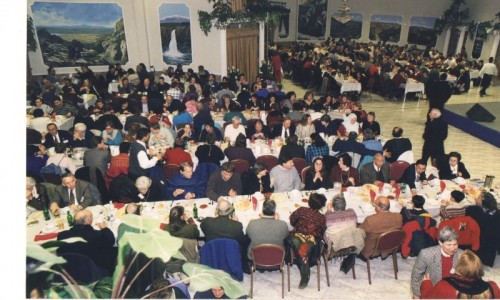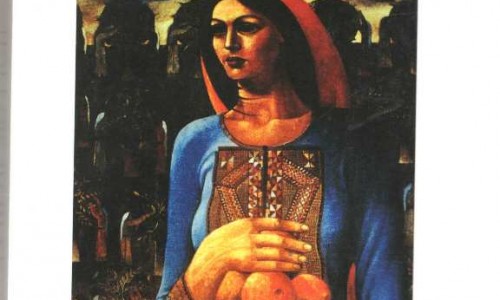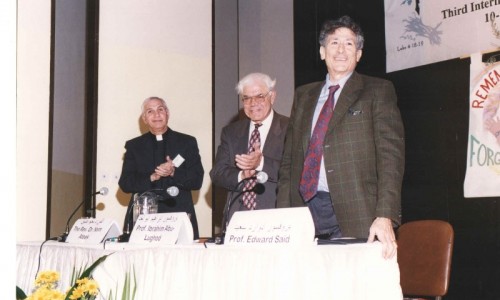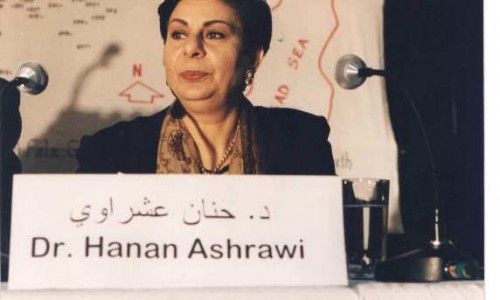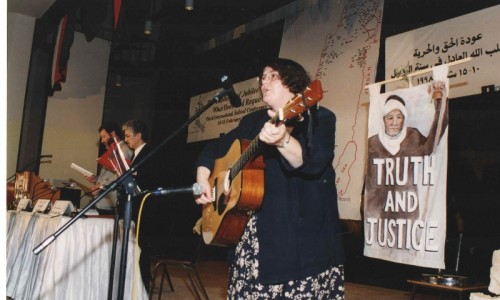
Furthermore, we chose Bethlehem for political and theological reasons. It is the place from which the holy family, Joseph, Mary, and Jesus, left as refugees to escape the threat of King Herod. Herod, on the one hand, still represents people in power today who viciously use their power in order to terrorise and kill others. Joseph, Mary, and Jesus, on the other hand, represent millions of refugees in the world, including Palestinian refugees who have been displaced as a result of injustice. At the same time Jesus Christ is, for us Christians, the incarnate Lord, born in Bethlehem, and the liberator who offers us new hope and life and the strength to struggle against all forces of injustice and oppression. Bethlehem, therefore, seemed an appropriate venue at a time when the Palestinians were going to commemorate 50 years of oppression and dispersion. Bethlehem stood for us as a symbol of hope, a better future, and renewed possibilities for liberation.
Having chosen as conference theme “The Challenge of Jubilee: What does God require?”, the words of the prophet Micah 6.8 seemed a fitting correlation and an important guiding principle. “He has told you, O mortal, what is good; and what does the Lord require of you but to do justice, and to love kindness, and to walk humbly with your God”.
On the first full day of the conference, we invited the participants to take a hard and sobering look at the past fifty years. It was important to recall and evaluate the past, not to live in it, nor to dwell on it, but to learn from it, and to gain courage and wisdom in order to confront the future. As participants looked at the past, they were encouraged to lift constantly before their eyes the words of Micah, “love mercy”. Admittedly, this is not easy for many Palestinians. It is difficult to feel merciful when one remembers the injustice. Many people find it difficult to forget and forgive. The challenge is ever before us to pray for grace to be merciful and forgiving while, at the same time, maintaining vigilance in the face of oppression and standing up against injustice. To be merciful means to be open always to the possibility of finding a resolution to the conflict that will be based on justice, a justice which will restore the humanity to both the oppressor and the oppressed. We live in a world where strict and absolute justice is not possible. Mercy must enter in without compromising the demand for justice.
On the second day, the participants were exposed to the present situation. They were encouraged to remember Micah’s words, “Do justice”. We felt it was impossible to give a comprehensive picture of life under occupation within the limited time of the conference. We organised, therefore, eight different sessions covering a whole range of topics that touch on the various aspects of Palestinian life. The sessions were conducted off-campus in for community and church centres throughout Bethlehem. The participants were encouraged to attend only two of the eight, with the option of purchasing the audiocassettes of those sessions they could not attend. The topics included religious fundamentalism, Christian fundamentalism, Zionism, Christian-Muslim relations, Jubilee and the biblical tradition, the Bible and Zionism, human rights issues, economics and Jubilee, and pilgrimage alternatives.
On the third day, we plan to do something a bit unusual and innovative. We wanted the participants to experience some of the contemporary stations of the cross which have become part of the daily experience of our Palestinian people. In essence it provided the living and actual illustrations of the verbal, academic lectures which were presented in the morning. 10 buses transported the participants to different sites where they experienced firsthand the ongoing injustice. The sites visited included checkpoints, demolished houses, destroyed villages, and confiscated land. At every station, participants were able to see, reflect, learn and pray. The day ended with Professor Edward Said’s keynote address which knitted together the historical and political situation with a challenge to both local and international participants to become active in making history.
On the last day of the conference, we look to the future with the motto of the day, “Walk humbly with God)”. We wanted to give some answers to questions such as, what contribution can we make to adjust these? How can we use the challenge of Jubilee? How can our friends help us who experience injustice and pain? What is the vision of peace for the future, and what are the spiritual resources available to us as we move ahead? The conference concluded at St Catherine’s Nativity Church with a worship service of dedication and renewal for the work of justice, peace, and reconciliation.
Someone has said that our problem today is that we have reversed Micah’s words. Instead of doing justice and loving mercy, we tend to love justice and to do mercy. Many of us are more eager to engage in works of mercy, in lending a helping hand and standing up for justice. Certainly people in power are more ready to be generous then to be just. They are keen on philanthropy but not on justice. In our Third International Conference, we wanted to emphasise the importance of doing justice, loving mercy, and working humbly with God as we lifted high the challenge of Jubilee.
This volume includes most of the papers which were presented at the conference. We hope that the reader will find them stimulating and instructive.
Al- Nakba and Jubilee
The last fifty years have brought untold suffering upon the Palestinian people. Their only sin and crime was to say “no” to the occupation of their country. For many people in the West, the success of the Zionists in 1948 was impressive. Within a few months, three quarters of a million Palestinians were displaced, and over three quarters of the land of Palestine was conquered. Some Palestinians fled in terror, like Joseph, Mary, and Jesus at the time of her, while others were forced out at gun. More recent research by Dr Salman Abu-Sitta, former member of the Palestine National Council has shown that 531 villages and towns were depopulated, and that Palestinians were uprooted from over 662 other localities. In other words, the Palestinians were displaced from over 1200 localities in Palestine. Many of us Palestinians today still recall the details of our catastrophe as children, or carry with us the memories of our parents who were uprooted from their homes. In those days the sufferings of the Palestinians did not really matter to many people in the world. What mattered was to find a home for the suffering Jews who had gone through the Holocaust, many of whom would have preferred to go to North America rather than come to Palestine, but it was to Palestine that design must wanted them to come.
Approximately 35 percent of the Jewish people in the world live in Israel today. Over the last 50 years, Israel has grown and developed tremendously. Its existence, however, has been maintained by two important factors, namely, it’s for minimal military power, and the unflinching and uncompromising support of the United States. Undoubtedly, to a mere onlooker, Israel has developed in leaps and bounds, surpassing many other countries. Were it not for the basic injustice to the Palestinians, one could not help but be impressed by what Israel is accomplished for its people. It is the injustice that is the termite that eats at its core. It is injustice to the Palestinians that exacerbates Israel’s feeling of insecurity.
From an Israeli perspective, it is impossible to evaluate the last 50 years of Israel’s history without a reference to the Holocaust. The Holocaust was a basic injustice done to use. The tragedy of the Holocaust, however, has been addressed rather adequately. The world has been continuously condemning it. The guilt has been admitted, the compensations have been and continue to be extended quite generously to the State of Israel, to the Holocaust survivors, and to the victims’ children. Today, when the world looks back in greater objectivity on the events of the last 50 years, many people realise the tremendous injustice done to the Palestinians. But the tragedy of Palestine has not yet been dealt with properly and adequately. An increasing number of Jews is beginning to admit the guilt, and rewrite more accurately the history of the last fifty years; but the guilt has not been recognized by the government of Israel. In fact, many Palestinians, the Oslo peace process was an attempt by the Americans and the Israelis legalise and legitimise the injustice rather than to address it justly.
Nowadays, when Zionist ideology and its claim to the land of Palestine seems flimsy, it is the appeal to the Holocaust that has become paramount. The Holocaust has been used as the most convincing argument in the rationale for the establishment of the state of Israel. Yet as classical Zionism wanes, biblical signs has become a formidable force among the right-wing Jewish and Western Christian Zionists in their apologetic for the state.
Be that as it may, we live today with certain important facts. The state and people of Israel are a reality, and the Palestinian people and their authority are likewise a reality. Both are here to stay. The Palestinians still seek justice and Israel still need security. If Israel will give Palestinians justice, it will, in return, receive security. There is no other formula for a lasting peace.
As Israel celebrates its 50th anniversary, we, people of faith gathered in Bethlehem, who ostensibly have no political power or clout, and who seem weak and vulnerable, want to lift a prophetic voice and address the people and government of Israel. We simply say “all your outward and impressive celebrations will not hide your nakedness of injustice. We offer you this year the challenge of Jubilee so that you may live and become secure; and so that the Palestinians may live also in justice and security.”
What then is the challenge of the Jubilee? I would like to mention three points.
- The sovereignty of God. At the heart of the biblical Jubilee is the sovereignty of God. God is the creator and redeemer of the world. To God belongs for land of Palestine, as does the whole world. We are all tenants, aliens, and strangers (Leviticus 25. 23). We will pay the rent to God, the real loan. Once we truly recognize the sovereignty of God, we know that it has moral, social, and political implications. For many of us, this concept carries with it the vital need for sharing the land under God. We are talking about an inclusive theology of land. At the heart of this theology is the one and only God there was a God of the Palestinians, the Israelis, and the whole world, who is sovereign over all. If we accept the major premise that the land belongs to God, then, save Palestinians and Israelis have faced by God on it, both must year, and both are accountable to God. From the perspective of this contextualized this Christian theology we can very well say that this land is God’s gift to all the people of this land, namely, Palestinians and Israelis. This theology aims at peacemaking. The first challenge of the Jubilee, therefore, is to accept the sovereignty of God over the whole of this land. We believe in the one God who loves and cares for all of God’s children. God is colour blind, ethnic blind, and race blind. God sees us all as humans created in God’s image.
- The basic premise on which the Jubilee is built is the fact that God is a God of justice, and wills that justice be done in the world. The Jubilee year was ordained to set things right. The Jubilee rationale is that, due to humanity’s propensity to people, God’s will for the world can be thwarted and frustrated. In the Jubilee year, God says to humans, stop the injustice, stop the exploitation, free the oppressed, forgive the debts of the poor, return the land to its lawful owners.
In other words, at the basis of the Jubilee is the proclamation of liberty to all the people of the land (Leviticus 25. 10). True liberation comes when justice is done. No liberation or peace is possible people live in oppression and under occupation. No liberation is possible if the land continues to be confiscated and monopolised by those in power. In this Jubilee year, God asked us to take stock of where things are gone wrong and render justice to those it has been denied. The challenge is for justice be tempered with mercy. This is clearly defined by calling on the state of Israel to withdraw from the whole of the 23 per cent of the land of Palestine which is the West Bank and Gaza, and allow the Palestinians to establish their own sovereign state on their own soil, with East Jerusalem as its capital. This is how most Palestinians today to find justice with mercy. The challenge of Jubilee is that justice must be done.
In order for Israel to live securely, it has to live justly, for the last 50 years, it is lived by the power of its gun and that of the United States. It can presumably continue to do so for many years to come, so long as the billions of dollars keep pouring in, and the military hardware is supplied. Israel, however, will never be really secure until justice is done in the Palestinians. Security will be achieved when Israel accepts to live justly with its Palestinian neighbours. This specifically means to stop all confiscation of Palestinian land and to withdraw its control from the whole of the West Bank and Gaza. It must all forms of humiliation, exportation of, and discrimination against the Palestinians. Israel must treat the Palestinians as human beings who have rights to their land and to a life of liberty and peace. As we emphasise the importance of justice in the Jubilee year, we denounce the use of violence or military force as a way of resolving conflicts anywhere in the world.
- The challenge of Jubilee implies the possibility of a new era, a new beginning between Palestinians and Israelis. In other words, when the oppressed set free their dignity and humanity is restored to them, and they become three human beings. When the land is returned to its legal owners, it means that people can cultivate it and live from the gift of the land and its produce which God is given. When the debt of the poor is cancelled, they can have a fresh start with hope for a better future for themselves and their families. The Jubilee allows for new attitudes to develop and perceptions to be created. The Palestinians and Israelis will not perceive each other anymore as enemies, but as neighbours and potential friends and partners. An inter-dependency would then develop because all the inhabitants of the land would see themselves working together under God and for a shared destiny. This is a realisable dream. The Jubilee opens the possibility of a better future for all of us.
This is the challenge of Jubilee. This is what God requires of us we came to proclaim the Jubilee for the jubilation of our land and all of its inhabitants. There is, however, an added note for those of us who are Christians. Our Lord Jesus Christ has given us an even higher calling whenever we think of the Jubilee. Basically he says to us that the Jubilee year should not be celebrated once every seven years or only every 50 years – it should be our daily life and practice. God calls us to a life of virtual Jubilee. We are called to work for the abundant life, life lives to the fullest. This surely means the life of liberation and peace for all people. May we fulfil our calling as we stand in solidarity, as we work together for the liberation of all the oppressed people of the world.
Jerusalem
Christmas 1998

